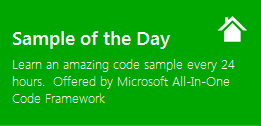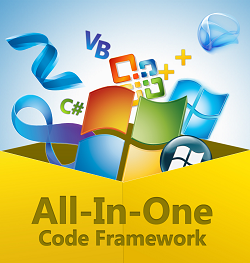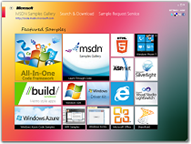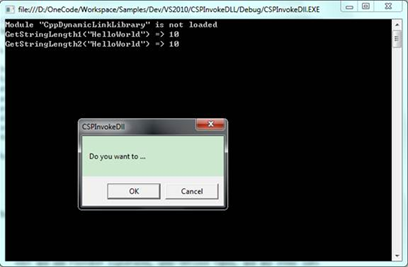[Sample of May 2nd] C#/VB P/Invokes a native DLL
 |  | |
 |  | |
Sample Downloads
C#: https://code.msdn.microsoft.com/CSPInvokeDll-b05779d0 VB: https://code.msdn.microsoft.com/VBPInvokeDll-e220099a
Today’s sample demonstrates how to P/Invoke native DLLs from C# and VB.NET.
 You can find more code samples that demonstrate the most typical programming scenarios by using Microsoft All-In-One Code Framework Sample Browser or Sample Browser Visual Studio extension. They give you the flexibility to search samples, download samples on demand, manage the downloaded samples in a centralized place, and automatically be notified about sample updates. If it is the first time that you hear about Microsoft All-In-One Code Framework, please watch the introduction video on Microsoft Showcase, or read the introduction on our homepage https://1code.codeplex.com/.
You can find more code samples that demonstrate the most typical programming scenarios by using Microsoft All-In-One Code Framework Sample Browser or Sample Browser Visual Studio extension. They give you the flexibility to search samples, download samples on demand, manage the downloaded samples in a centralized place, and automatically be notified about sample updates. If it is the first time that you hear about Microsoft All-In-One Code Framework, please watch the introduction video on Microsoft Showcase, or read the introduction on our homepage https://1code.codeplex.com/.
Introduction
Platform Invocation Services (P/Invoke) in .NET allows managed code to call unmanaged functions that are implemented and exported in unmanaged DLLs. This VC# code sample demonstrates using P/Invoke to call the functions exported by the native DLLs: CppDynamicLinkLibrary.dll, user32.dll and msvcrt.dll.
Running the Sample

Using the Code
A. P/Invoke functions exposed from a native C++ DLL module.
Step1. Declare the methods as having an implementation from a DLL export.
First, declare the method with the static and extern C# keywords. Next, attach the DllImport attribute to the method. The DllImport attribute allows us to specify the name of the DLL that contains the method. The general practice is to name the C# method the same as the exported method, but we can also use a different name for the C# method. Specify custom marshaling information for the method's parameters and return value, which will override the .NET Framework default marshaling.
For example,
[DllImport("CppDynamicLinkLibrary.dll", CharSet = CharSet.Auto, CallingConvention = CallingConvention.Cdecl)]
internal static extern int GetStringLength1(string str);
These tools can help your write the correct P/Invoke declartions.
Dumpbin: View the export table of a DLL
PInvoke.NET: PInvoke.net is primarily a wiki, allowing developers to find, edit and add PInvoke* signatures, user-defined types, and any other info related to calling Win32 and other unmanaged APIs from managed code such as C# or VB.NET.
PInvoke Interop Assistant: It is a toolkit that helps developers to efficiently convert from C to managed P/Invoke signatures or verse visa.
Step2. Call the methods through the PInvoke signatures.
B. P/Invoke C++ classes exposed from a native C++ DLL module.
There is no easy way to call the classes in a native C++ DLL module through P/Invoke. Visual C++ Team Blog introduced a solution, but it is complicated.
The recommended way of calling native C++ class from .NET are:
1) use a C++/CLI class library to wrap the native C++ module, and your .NET code class the C++/CLI wrapper class to indirectly access the native C++ class.
2) convert the native C++ module to be a COM server and expose the native C++ class through a COM interface. Then, the .NET code can access the class through .NET-COM interop.
C. Unload the native DLL module.
You can unload the DLL by first calling GetModuleHandle to get the handle of the module and then calling FreeLibrary to unload it.
[DllImport("kernel32.dll", CharSet = CharSet.Auto, SetLastError = true)]
static extern IntPtr GetModuleHandle(string moduleName);
[DllImport("kernel32.dll", CharSet = CharSet.Auto, SetLastError = true)]
[return: MarshalAs(UnmanagedType.Bool)]
static extern bool FreeLibrary(IntPtr hModule);
// Unload the DLL by calling GetModuleHandle and FreeLibrary.
if (!FreeLibrary(GetModuleHandle(moduleName)))
{
Console.WriteLine("FreeLibrary failed w/err {0}",
Marshal.GetLastWin32Error());
}
More Information
�� MSDN: Platform Invoke Tutorial
�� MSDN: Using P/Invoke to Call Unmanaged APIs from Your Managed Classes
�� MSDN: Calling Win32 DLLs in C# with P/Invoke
�� PInvoke.NET